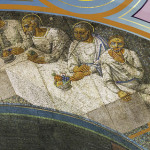We run our website the way we wished the whole internet worked: we provide high quality original content with no ads. We are funded solely by your direct support. Please consider supporting this project.
How do you respond to Matthew 20:17–19?
“The Son of Man will be handed over to the chief priests and scribes, and they will condemn him to death; then they will hand him over to the Gentiles to be mocked and flogged and crucified, and on the third day he will be raised.”
God knew perfectly the hearts of all the Jewish and Gentile people who would be involved in the crucifixion. Indeed, it seems he chose this moment in history to send Jesus into the world precisely because he saw that circumstances were developing in such a way that his plans would be readily accomplished. Hence Paul says that “at the right time” Christ died for us (Rom. 5:16, cf. Mark 1:15, Gal. 4:4, Eph. 1:10).
The Lord knew that, with a minimal amount of providential intervening, these evil people would act in certain ways toward his Son. We need not conclude, therefore, that God had to foreknow from the foundation of the world every decision each of these people would make—together with all the free agents in world history—for him to achieve his objectives. He is wise enough to ensure the success of his plan while working around and through the free agency of people. And he does not need a “crystal ball” vision of the future to do it.
Category: Q&A
Tags: Open Theism, Q&A
Topics: Open Theism, Responding to Objections
Verse: Matthew 20
Related Reading

How do you respond to John 13:18–19; 17:12?
“I am not speaking of you all; I know whom I have chosen. But it is to fulfill the scripture, ‘The one who ate my bread has lifted his heel against me.’ I tell you this now, before it occurs, so that when it does occur, you may believe that I am he.’” Jesus prays…

The Open View of Messianic Prophesies
Image by Lawrence OP via Flickr A number of passages speak of particular events being foreknown by God, even events resulting from individuals’ free will. For example, dozens of prophesies in the OT accurately predict details about the coming Messiah (e.g., he would be born in Bethlehem; arise out of the lineage of Abraham; be executed with…

Doesn’t the open view demean God’s sovereignty?
The Open view demeans God’s sovereignty only if one assumes that “sovereignty” means “meticulous control.” By why think this is the way God wants to rule the world? The biblical narrative presents a God who gives humans (and apparently angels) free will, who is flexible and creative in running the world, and who relies at…

Problems with the Simple Foreknowledge View
Some have proposed a model of divine foreknowledge which allows them to avoid the dilemma of affirming either that God creates people for the purpose of sending them to hell (Calvinism) or that he creates them without certain knowledge of their fate (open theism). In this alternative view God knows that certain individuals will be…

Don’t Wilberforce’s achievements refute your stance on the separation of faith and politics?
Question: William Wilberforce was a Christian whose passionate involvement in politics almost single-handedly brought an end to the slave trade in 19th century England. Don’t his achievements show the importance of Christians being involved in politics, thus refuting your contention that Christian’s should keep their faith and values separate from politics? Answer: First, while I…

